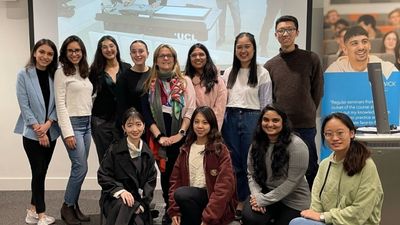MSc Economics students take part in behavioural marathon

MSc Economics students take part in behavioural marathon
Thursday 10 Mar 2022On 21 February a group of MSc students from the Department of Economics at Warwick took part in a Behavioural Marathon (or hakathon) organised by the Behavioural Environmental Economics Team (BEET) at UCL, in partnership with HUBBUB, and co-ordinated by Dr Lory Barile, Director of Postgraduate Taught Programmes at Warwick.
Behavioural Challenges

Three teams of MSc Economics students took part in the event which required a few days of preparation. Hubbub provided three sustainability challenges to incentivise more plant-based food consumption, mitigate the impact of raising energy costs, and to promote sustainable fashion.
The teams had to select a challenge, prepare a solution incorporating theories and suggestions from behaviour change and behavioural economics, and develop a presentation to describe their proposed solutions.
All competing teams from Warwick and UCL took part in a marathon event when each participating team had 8 minutes to present their solution and answer any questions from the judging panel which included three members from Hubbub, Dr Lory Barile and Dr Lorenzo Lotti (Director of BEET).
The teams could choose to work on a solution to one of the three challenges that make environmental action desirable: the first one dealt with the consumption of red and processed meat, the second one looked into supporting people vulnerable to fuel poverty, and the last one focused on reducing carbon and water footprints coming from clothing consumption.
The marathon in which students presented their solutions was a great success. It was a hybrid event where Warwick teams gathered in-person and their presentations were streamed into a virtual event (Photo: with Dr Lory Barile and Warwick Teams on the day of the Behavioural Marathon, 21 February 2022).
The participants commented on the learning experience of having had to show their ability to apply behavioural theories into practice. They also agreed that it was an enjoyable and fun experience for all.
The Winning Team
The winners of the challenge at Warwick was a team of four MSc Economics students (Prang Renuchat, Priya Bhatter, Sumiran Goyal and Yanan Shao) who presented their solution to Challenge 1 - How to inspire football fans and their families to eat more plant-based meals and less meat and dairy.
View their presentationLink opens in a new window to find out what solutions they proposed.
Dr Lory Barile, Director of the MSc Programmes and co-ordinator of the Behavioural Marathon at Warwick commented on the event:
"It was great to see so many Warwick students competing in the Behavioural Marathon 2022. This was not only a wonderful opportunity for our MSc students to apply their knowledge and skills to real life challenges, but also an example of how Education for Sustainable Development (ESD) can be embedded in our curriculum to help students develop future-proof skills, which are currently highly demanded by employers. The students have enjoyed the event and I'm pleased that they've done extremely well."
In line with her research and teaching interests, and following COP26, Dr Barile is currently leading on a new ESD as part of the Warwick International Higher Education Academy (WIHEA) Learning Circle aimed at embedding Education for Sustainable Development within the University curriculum.
The representatives of the winning teams form Warwick and UCL will participate with Lory and Lorenzo at the Advanced HE Sustainability Symposium which will take place on 29-30 March 2022. The two winning teams will present their suggested solutions at Somerset House in London at the end of March.
The Experience - putting theory into practice
Here is what the student participants said:
